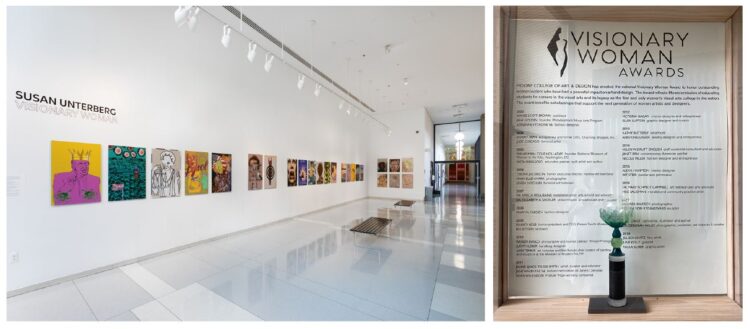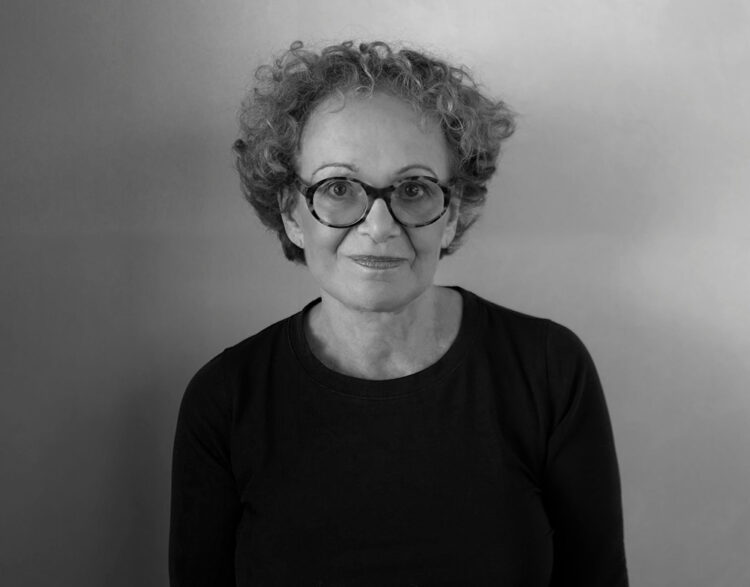The Phillips Collection is commemorating the 100th anniversary of Women’s Suffrage by presenting an exhibition (Celebrating Women Artists in The Phillips Collection, installed in the Phillips House galleries and presented online as the museum remains closed due to covid-19) and a virtual panel discussion (Artists of Conscience: Women, Race, Representation on September 24), both of which will feature artists who have received the Anonymous Was a Woman (AWAW) Award founded by Susan Unterberg. An artist and philanthropist based in New York, Unterberg is the recipient of the 2020 Visionary Woman Award from the Moore College of Art & Design in Philadelphia; our presentation coincides with her exhibition there.
Here are excerpts from Unterberg’s text “Activist Philanthropy.” Join us on September 24 to hear more from Unterberg and about AWAW.

Susan Unterberg’s exhibition at the Moore College of Art & Design (Photo: Joe Hu) and the Visionary Woman Award
In 1996, in reaction to the NEA cuts, I quietly started Anonymous Was A Woman, an organization that awards no-strings-attached grants of $25,000 each year to 10 women artists over the age of 40. I had recently inherited a foundation and, as a working artist in the middle of my own career, I was intimately familiar with the challenges that women artists face.
The mid-career period can be a desert for women artists: they are no longer hot, young commodities fresh for discovery, nor are they sufficiently old to be “rediscovered.” Women over 40 must also often balance the demands of family life—childcare, parental care, and, in some cases, single motherhood. Plus, studies have revealed that women are underpaid relative to men both in the art world and in other professions, which is notable since many women artists must hold multiple jobs to make ends meet.

Susan Unterberg. Photo: Alain Simic
To date, we have awarded over $6 million to 240 artists. The impact has been significant, with artists who received the award going on to exhibit at major museums and biennales, pursue ambitious new projects, or simply take a well-deserved break. But a recent data study released by Artnet News and In Other Words sharply challenged the illusion of progress for women in the arts: between 2008 and 2018, only 11 percent of art acquired by the country’s top museums for their permanent collections was by women; only 14 percent of museum exhibitions featured women artists; and the sale of women’s artwork in the global auction market comprised only 2 percent of the total market share. Needless to say, we have a long way to go.
In 2018, I made the choice to reveal my identity as the founder and sole patron of Anonymous Was A Woman. In a political climate where women were coming out to tell their stories in greater numbers than ever before, I felt that it was important to join the conversation as a vocal supporter of women artists, to proudly express my solidarity, and to draw attention to the ongoing need for support of this demographic. Anonymous no longer, I also hoped to use my platform to expand the reach of our grant and to offer a model to other philanthropists.
Anonymous Was A Woman’s mission as feminist philanthropy that begins from a place of advocacy and activism. This type of philanthropy—directed to a very specific need; awarded with no strings attached; and immune to the bureaucracy and entrenched structures of already-powerful institutions—ensures that funds have the maximum possible impact. Funds are awarded irrespective of some of the factors that impact decision-making within an institution (including placating donors, considering revenue or attendance implications, or prioritizing projects that may bring with them the support of well-resourced galleries). Most importantly, it allows for complete freedom to how the funds are used. This type of advocacy is crucial at a moment when there is a total vacuum of government support for the arts. While I am uncomfortable with the label of “philanthropist,” the truth is that it is what I am. And so I urge other philanthropists to take seriously the crisis of the current moment and consider activist philanthropy in arts and culture by directly funding the work of artists and creators.
